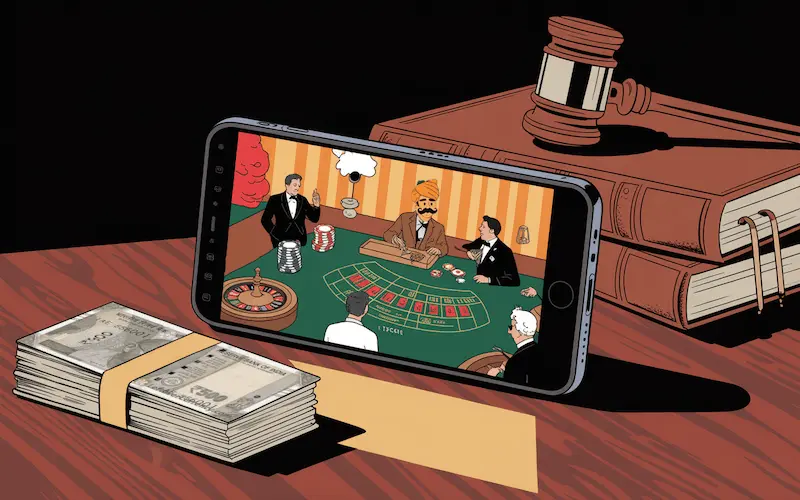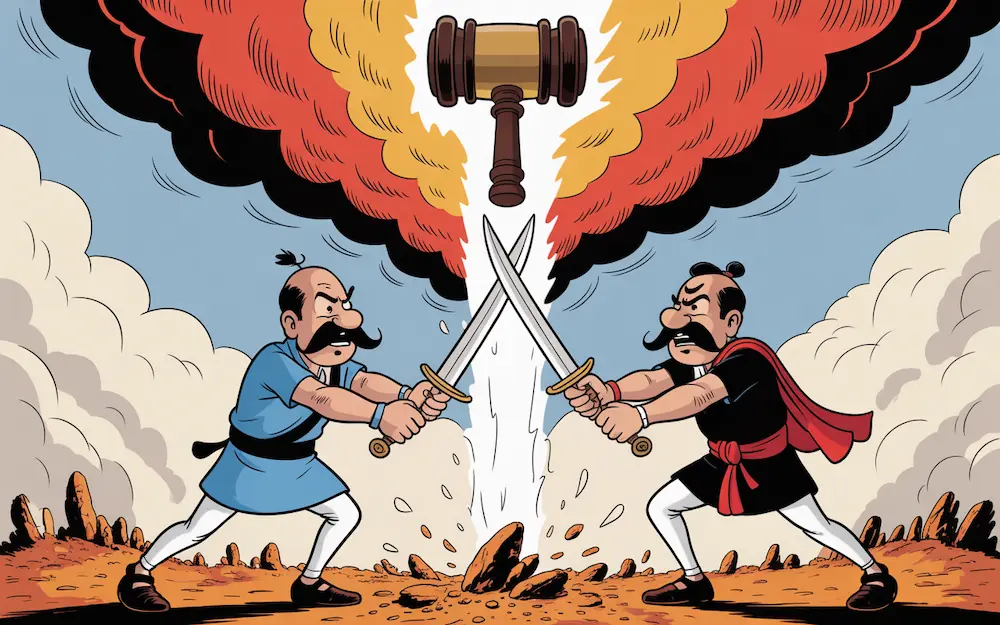
The Indian online gaming industry has undergone a dramatic evolution, fueled by mobile-first innovation, digital payments, and rising user engagement. With the explosion of real-money gaming platforms offering everything from poker and rummy to fantasy sports, trivia, and casual games like Ludo - the legal question at the heart of it all remains: Is it a game of skill or game of chance? This classification determines whether the game is protected under Indian law or amounts to illegal gambling.
This article offers an in-depth legal analysis of the current framework governing online gaming laws in India in 2025, particularly involving real-money wagers, drawing from constitutional law, judicial precedents, state-wise statutes, regulatory developments, and compliance obligations. It also examines recent controversies, enforcement actions, and the shifting treatment of poker, Ludo, and binary prediction apps.
The Foundational Legal Framework
Public Gambling Act, 1867
The Public Gambling Act, 1867 is the core central law prohibiting the operation of common gaming houses. However, Section 12 of the Act explicitly excludes games of skill, stating that “nothing in this Act shall apply to any game of mere skill wherever played.”
But since gambling is a state subject (Entry 34, List II, Seventh Schedule), individual states are free to adopt, amend, or enact their own gambling laws. While Maharashtra, Madhya Pradesh, and others follow the central Act, states like Telangana, Andhra Pradesh, and Nagaland have introduced distinct legislation with stricter or licensing-based regimes.
Indian Contract Act, 1872
Section 30 of the Indian Contract Act renders wagering agreements void. However, this section does not apply to games of skill, and multiple courts have held that business models built around skill-based games are legally enforceable.
Information Technology Act, 2000
The IT Act does not specifically regulate online gaming or gambling. While it provides a framework for digital conduct, data protection, and intermediary liability, it is silent on the legality of online games involving stakes. In the absence of central legislation for online gaming, state laws and judicial interpretation continue to fill the void. However, the Central Government has notified amendments to the The Information Technology (Intermediary Guidelines and Digital Media Ethics Code) Rules, 2021 in 2023 which have implications on online gaming, as discussed below in this article.
Defining Skill vs. Chance: Judicial Precedents
Landmark Cases
- State of Bombay v. R.M.D. Chamarbaugwala [AIR 1957 SC 699]: The Supreme Court held that games involving substantial skill are protected under Article 19(1)(g) of the Constitution.
- Dr. K.R. Lakshmanan v. State of Tamil Nadu [1996 AIR 1153]: Declared horse racing to be a game of skill. The Court stated:
“Gambling in a nut-shell is payment of a price for a chance to win a prize. Games may be of chance, or of skill or of skill and chance combined. A game of chance is determined entirely or in part by lot or mere luck. The throw of the dice, the turning of the wheel, the shuffling of the cards, are all modes of chance. In these games the result is wholly uncertain and doubtful. No human mind knows or can know what it will be until the dice is thrown, the wheel stops its revolution or the dealer has dealt with the cards. A game of skill, on the other hand - although the element of chance necessarily cannot be entirely eliminated is one in which success depends principally upon the superior knowledge, training, attention, experience and adroitness of the player. Golf, chess and even Rummy are considered to be games of skill. The courts have reasoned that there are few games, if any, which consist purely of chance or skill, and as such a game of chance is one in which the element of chance predominates over the element of skill, and a game of skill is one in which the element of skill predominates over the element of chance. It is the dominant element - "skill" or "chance" - which determines the character of the game.” - Varun Gumber v. UT of Chandigarh [2017 Cri LJ 3827]: Punjab and Haryana HC ruled that Dream11’s fantasy sports format involves skill and does not constitute gambling :-
“19…………Even from the submissions and contentions of respondent-company and factual position admitted in writ petition, I am of the view that playing a fantasy game by any particular user involves virtual team by him which would certainly require considerable skill, judgment and discretion. The participant has to assess the relative worth of each athlete/sportsperson as against all athletes/sports persons available for selection. He is required to study the rules and regulations of strength of athlete or player and weakness also. The several factors as indicated above submitted by the respondent-company would definitely affect the result of the game….”
7. The respondent company’s website and success in Dream-11’s fantasy sports basically arise out of users' exercise, superior knowledge, judgment and attention. I am of the further view that the element of skill and pre-dominant influence on the outcome of the Dream-11’s fantasy than any other incidents are and therefore, I do not have any hesitation in holding that any sports game to constitute the game of “mere skill” and not falling within the activity of gambling for the invocation of 1867 Act and thus, the respondent-company, is, therefore, exempt from the application of provisions, including the penal provisions, in view of Section 18 of 1867 Act. Equally so, before I conclude, I must express that gambling is not a trade and thus, is not protected by Article 19(1)(g) of Constitution of India and thus, the fantasy games of the respondent company cannot said to be falling within the gambling activities as the same involves substantial skills which is nothing but is a business activity with due registration and paying the service tax and income tax, thus, they have protection granted by Article 19(1) (g) of Constitution of India.” - The Rajasthan HC in Ravindra Singh Chaudhary vs. Union of India & Ors [Judgment dated 16.10.2020 in D.B. Civil Writ Petition No. 20779/2019] and Bombay HC in Gurdeep Singh Sachar v Union of India & Ors. [Judgment dated 30.04.2019 in Public Interest Litigation No.16 of 2019] echoed this view, holding that fantasy sports involve user judgment, statistical analysis, and strategic selection. Relevant portion of the judgment of the Rajasthan High Court is as follows :-
“It can be safely deduced from these findings that the result of the fantasy games offered by respondent No.5 is not determined merely by chance or accident, but the skill of the participant determine the result of the game having predominant influence on the outcome of the fantasy game. Whether any particular team in the real world match wins or loses, is also immaterial as the selection of virtual team by the participant involves choosing players from both the teams playing in the real world. It is also clear that offering the fantasy games of Dream-11 involving substantial skills is a business activity and not wagering having protection granted by Article 19(1)(g) of the Constitution”
Current SC Position
The legality of online fantasy sports in India - particularly Dream11’s format - has been tested across multiple High Courts and is now under the Supreme Court’s scrutiny. In Gurdeep Singh Sachar v. Union of India & Ors., the Bombay High Court (2019) upheld that Dream11’s fantasy contests involved a preponderance of skill and did not fall within the ambit of the Public Gambling Act, 1867. This judgment was later relied upon by the Rajasthan High Court in Chandresh Sankhla v. State of Rajasthan [Judgment dated 14.02.2020, Civil Writ Petition 6653 of 2019], which reaffirmed that Dream11’s business model constituted a game of skill and was constitutionally protected under Article 19(1)(g).
Although Special Leave Petitions (SLPs) filed against these rulings by private parties were dismissed, the State of Maharashtra’s SLP resulted in the Supreme Court issuing a stay on the Bombay High Court’s judgment via order dated 6 March 2020. As of July 2025, the matter remains pending before the Supreme Court. The pendency impacts licence applications within the state, which are being kept in abeyance pending decision of the Supreme Court, as seen in M/s. P. Z. Skill Games (OPC) Pvt. Ltd. v. State of Maharashtra [Final Order dated 4 January 2024 in Writ Petition No. 13138 of 2023, Bombay HC]. M/s. P. Z. Skill Games (OPC) Pvt. Ltd. has also filed a Special Leave Petition before the Supreme Court bearing SLP(C) Diary No. 19240/2024 which stands tagged with the matter of Gurdeep Singh Sachar. While the Rajasthan and Punjab & Haryana High Court rulings continue to hold force, the apex court’s future ruling may ultimately define the national position on the legality of fantasy sports.
Legal Tests for Skill-Based Games
To summarise, an online video game/ app involving elements of competition based prizes in the form of money would not fall within the purview of gambling within the scope of the Public Gambling Act, 1867 (and similarly worded enactments) where:-
- the game consists of predetermined number of rounds;
- the user/player is required to study the rules of the game;
- the game involves considerable element of skill on the part of the user/player in making assessment about in-game variables in making selection/judgment on the basis of rules and attributes of in-game characters, including an assessment of strengths and weaknesses; playing the game requires user/player’s exercise, superior knowledge, judgment, discretion and attention on the part of the user/player;
- where a game is somehow tied to real-world events occurring or not occurring, the result of the game should be sufficiently separated from the real-world events;
- the element of skill should have pre-dominant influence on the outcome of the game than any other incidents;
- the result of the game upon which prize money is dependent is not determined by chance or accident, or on the likelihood of anything occurring or not occurring; and
- the business activity has due registrations and paying service tax and income tax.
To determine whether a game is based on skill, Indian courts apply the “predominance of skill” test, examining:
- Rule complexity
- Consistency of performance
- Impact of player decision-making
- Need for analysis or judgment
- Practice and training effects
- Independence from chance-based triggers (e.g., dice, spins, RNGs)
A game does not need to be purely skill-based. Even if chance is involved, the dominant element must be skill for the game to escape the definition of gambling. The the Supreme Court in M.J. Sivani & Ors. v. State of Karnataka [1995 6 SCC 289] held that:
"Even a skilled player in a game of mere skill may be lucky or unlucky, so that even in a game of mere skill chance must play its part. But it is not necessary to decide in terms of mathematical precision the relative proportion of chance or skill when deciding whether a game is a game of mere skill. When in a game the element of chance strongly preponderates, it cannot be game of mere skill. Therefore, it is not practicable to decide whether particular video game is a game of skill or of mixed skill and chance. It depends upon the facts, in each case.
Online Poker vs. Offline Poker: Legal Nuance
Poker has long occupied a legal grey area. Several states ban physical poker clubs, treating them as gaming houses. Yet, online poker has been viewed more favourably by courts, often due to the following:
- Control over the environment: Online poker platforms use technology to ensure fair gameplay, prevent collusion, and audit outcomes.
- No rake or house profit from outcomes: Platforms act as intermediaries, not participants.
- Strategic gameplay: Courts and legal experts increasingly view poker as involving probability, decision-making, and bluffing strategies - hallmarks of a skill game.
In M/s DM Gaming Pvt. Ltd. v. State of Uttar Pradesh [Judgment dated 29.08.2024 in WRIT - C No. - 3880 of 2024, Allahabad High Court], a Division Bench comprising Justices Shekhar B Saraf and Manjive Shukla issued a pivotal ruling affirming that poker and rummy are ‘absolutely’ games of skill, and not gambling. The bench directed local authorities in Agra to reconsider a license denial for DM Gaming Pvt. Ltd. and underscored that decisions should be grounded in legal reasoning rather than speculation about public order or gambling potential.
On 9 November 2023, the Madras High Court, in All India Gaming Federation & Ors. v. State of Tamil Nadu [WP 13203/2023], had struck down blanket prohibitions on online poker and rummy under the state’s 2022 act. The Court ruled that “online poker and online rummy are games of skill” and must not be treated as “games of chance,” affirming that digital gameplay does not alter the fundamental skill dynamics.
However, offline poker clubs remain vulnerable, particularly in states that have not formally legalized poker or lack licensing frameworks.
What About Ludo?
Though casual and nostalgic, when played for stakes, it raises questions of legality. The legality of Ludo as a real-money online game is currently under judicial examination. In a complaint filed before a metropolitan magistrate in Mumbai against the Ludo Supreme app, it was alleged that the game facilitated gambling by allowing users to stake money on dice-based outcomes. The magistrate dismissed the complaint, recognizing the role of user strategy in gameplay. However, the matter escalated to the Bombay High Court, which, in June 2021, issued notice to the State of Maharashtra to consider whether the game’s reliance on dice rolls rendered it a game of chance. While no final ruling has been issued yet, the case has sparked significant interest given the algorithmic structure of such apps and the potential for dice-driven randomness to outweigh user strategy. The outcome may have broader implications for casual gaming platforms that monetize through real-money mechanics.
The consensus is:
- If Ludo involves strategic movement, blocking, and planning, and the randomness of dice does not overwhelmingly determine outcomes, it may lean toward skill.
- But if outcome depends heavily on dice rolls, particularly in simplified app versions, courts may classify it as chance-based.
Until clarity emerges, Ludo-for-money platforms should proceed cautiously.
Enforcement Trends and Regulatory Push
Central Govt. Regulation?
Upon a question posed in Lok Sabha, the Minister for Electronics and Information Technology issued a statement that as per the provisions of article 246 of the Constitution, State Legislatures have exclusive power to legislate on matters related to betting and gambling, and that as per the provisions of article 162, matters related to betting and gambling lie within the executive power of the States. However, at the same time, the Central Consumer Protection Authority in India (CCPA) has issued a caution that betting and gambling are illegal, and betting and gambling camouflauged as gaming is illegal as well.
The Information Technology (Intermediary Guidelines and Digital Media Ethics Code) Rules, 2021
In 2023, the Ministry of Electronics and Information Technology (MeitY) released draft amendments to the Information Technology (Intermediary Guidelines and Digital Media Ethics Code) Rules, 2021, specifically targeting online gaming. “Online real money games” are defined in Rule 2(qd) of the Rules, 2021, which defines the term as “an online game where a user makes a deposit in cash or kind with the expectation of earning winnings on that deposit”. Further, “winnings” is explained to mean “any prize, in cash or kind, which is distributed or intended to be distributed to a user of an online game based on the performance of the user and in accordance with the rules of such online game”. The proposed framework aims to regulate real money gaming and wager-based gaming platforms, by introducing self-regulatory bodies, mandatory KYC, reporting of winnings, and safeguards for children. The objective, as stated in the PIB release, is to foster innovation while curbing addiction, fraud, and misinformation.
ED Crackdown on Probo
In 2025, the Enforcement Directorate froze Rs. 284 Crore in assets belonging to Probo, a binary prediction platform offering yes/no outcomes on sports, news, and events. The ED alleged violations of the Public Gambling Act, FEMA, and PMLA, arguing that Probo facilitated disguised betting. This case signals increasing scrutiny of so-called “prediction markets” or disguised betting models.
Haryana Prevention of Public Gambling Act, 2025
The Haryana Act, notified on 13 March 2025, modernizes the state’s gambling laws by defining key terms such as “bet,” “betting,” and “common gambling house”, explicitly including electronic and online platform. It criminalises public gambling and the operation of gambling houses, including virtual venues, with significant penalties: minimum three years’ imprisonment and fines starting from Rs. 2 lakh for operators. It further punishes match-fixing and spot-fixing in sports with jail terms of 3-5 years, increasing to 5-7 years for repeat offences, emphasizing Haryana’s firm stance on integrity in sports.
Haryana: What Is Allowed/ Skill-Based Games Exempted: The Act specifically distinguishes between “gambling” and “games of skill”, aligning with judicial precedent that protects preponderantly skill-based competitions. This exemption extends to fantasy sports, quiz-based games, and other skill formats, allowing them to operate legally within the state. Only activities where chance predominates, or overt sports betting, is prohibited, while operators of genuine skill-based products remain unaffected.
Tamil Nadu Online Gaming Authority (Real Money Games) Regulations, 2025
Enacted in February, 2025, the Tamil Nadu Regulation is aimed at prohibiting online gambling and online games of chance, including popular formats like Rummy and Poker, regardless of stakes. The regulation draws on definitions of terms like “online real money games” and “winnings” from the IT Rules, 2021 (above). Important implications for real money gaming companies include a restriction on minor players below 18 years of age, mandatory KYC verification of users, mandatory monetary restriction options and sounding of warnings every 30 minutes, addiction warnings, and even a mandatory “blank hours” from 12 AM to 5 AM where no gaming is to be allowed. There are also advertisement bans contemplated in the Regulation.
The Regulation has been enacted despite previous attempts to impose blanket bans on all forms of online gaming by the Tamil Nadu government being struck down by the Madras High Court in Junglee Games India Private Limited v. The State of Tamil Nadu [2021 SCCOnline Mad 2762] and** All India Gaming Federation v. The State of Tamil Nadu [2023 SCC OnLine Mad 6973].** Thus, the legality of the present 2025 Regulation remains to be tested by the Courts in an appropriate case. However, on the face of it, the Regulation risks creating a blanket ban on real money games, whether or not they constitute a game of skill or a game of chance.
Karnataka’s Proposed Online Gaming Regulator
Karnataka is drafting legislation to establish an Online Gaming and Betting Regulatory Authority, aimed at:
- Licensing skill-based games,
- Banning chance-based formats,
- Imposing high penalties on violators,
- Creating grievance redressal frameworks,
- Enabling self-regulation and compliance monitoring.
This signals a trend towards state-level regulators with expansive powers to audit, license, and penalize platforms.
Meghalaya: India’s First Comprehensive Gaming Law for Virtual & Online Formats
A significant legislative development in India’s gaming ecosystem is the Meghalaya Regulation of Gaming Ordinance, 2021 - one of the first modern statutes in the country to regulate both games of skill and games of chance, including those involving online, virtual, and video game formats.
Legal Recognition of Games of Skill: Under Section 2(i) of the Ordinance, “Games of Skill” are defined to include all games where there is a preponderance of skill over chance, including where:
- Skill relates to the strategizing of bets or wagers;
- Skill lies in team selection (e.g., fantasy sports) or virtual stock selection (e.g., simulation-based prediction platforms);
- Success depends on superior knowledge, training, attention, experience, or adroitness.
Crucially, the Explanation clause clarifies that games featuring domestic or international competitions, and those in the nature of action, adventure, mystery, or virtual sports, shall also be treated as games of skill.
Schedule A: Categories of Recognised Skill Games: Schedule-A to the Ordinance lists several categories of games falling within the definition of skill-based formats:
- Virtual Adventure Games
- Virtual Combat Games
- Virtual Mystery and Detective Games
- Virtual Racing (e.g., horse racing, car racing)
- Virtual Sports Gaming (e.g., Soccer, Golf, Cricket, Archery, Snooker, Pool, Bridge)
- Virtual Team Selection Games
This list is illustrative and not exhaustive, but it highlights the legislative recognition of genres that are commonly featured in esports, mobile gaming apps, and skill-gaming platforms.
Implications of Meghalaya’s Legislative Framework: While the Ordinance is applicable only within the territorial jurisdiction of Meghalaya, its significance is far-reaching:
- It represents formal legal recognition of both modern skill-based and chance-based games, irrespective of format (online or offline);
- It offers a template for other states considering regulation of online gaming or esports;
- It provides legal cues for classification, particularly where platform models blur the lines between casual gaming, esports, and real-money contests.
The legislative intent, particularly the inclusion of video game genres within a structured legal definition of skill -could support broader judicial interpretation in favour of such games under Article 19(1)(g) and existing Public Gambling Act exemptions.
GST Showdown at the Supreme Court
Online gaming companies are challenging the Rs. 1.12 lakh crore GST demand raised on real-money platforms. The question is whether skill games should be taxed like gambling at 28%. The SC is hearing the matter, and its ruling may redefine the fiscal future of this sector.
State-wise Positioning at a Glance - 2025:
- Telangana, AP: Blanket ban on all real-money gambling;
- Tamil Nadu: Ban struck down, but law in flux, 2025 regulation ostensibly imposes a blanket ban on all real money online games;
- Nagaland, Meghalaya, Sikkim: License regime for online skill games;
- Delhi, Punjab, Maharashtra, Rajasthan: Skill-based games permitted without license;
- Haryana: 2025 Act differentiates between gambling and games of skill in alignment with judicial precedents, allowing the latter to operate legally;
- Karnataka: Proposed regulator for licensing skill games.
Platforms must use geo-fencing and user declarations to avoid onboarding users from prohibited states.
Compliance Essentials for Platforms
KYC & Age Verification
- PAN or Aadhaar-based onboarding;
- Users must be 18+ under the Indian Contract Act;
- UIDAI/NSDL API integrations encouraged.
Geo-Fencing & Disclaimers
- Block users from banned states;
- Explicitly state state-wise restrictions in Terms of Use.
AML & PMLA
- Maintain transaction trails;
- File Suspicious Transaction Reports (STRs) where applicable;
- Adopt risk-based internal controls.
Tax Compliance
- Deduct 30% TDS on winnings > Rs. 10,000 under Section 194B;
- Issue Form 16A quarterly;
- Maintain payout ledgers for audit.
Consumer Protection
- Include clear refund, grievance redressal, and responsible gaming policies.
- Provide customer support access under CPA, 2019.
Looking Ahead: National Regulation or More Fragmentation?
With over 500 million online gamers in India and rising investments in the sector, there is mounting pressure for a unified national policy on online gaming. The current state-wise fragmentation hinders growth and creates legal uncertainty.
Industry stakeholders continue to advocate for:
- A central regulator (like TRAI or SEBI);
- National licensing and registration norms;
- Uniform definitions of skill and chance;
- Transparent tax treatment.
Until then, legal clarity will remain patchy, and compliance will require nuanced, state-sensitive legal strategies.
India’s online gaming landscape is a high-growth, high-risk arena. While the courts have been consistent in protecting games of skill under constitutional and legal safeguards, regulators and enforcement agencies are beginning to scrutinize platform models, payout structures, and monetization mechanics more closely. For founders, investors, and operators, this is the time to double down on legal audits, adapt technology for compliance, and plan for rapid legal changes. A platform that is legally sound, transparent, and proactive stands the best chance of surviving - and thriving - as the sector evolves.
More Articles
-

What Happens After SEIS? ASSSE Pilot Survey 2025 and Incentives for Service Exporters Under India’s Current Trade Framework
29 May 2025
-

Government Dues vs. IBC Protection: Can Tax Authorities Pursue Pre-CIRP Dues?
01 Jul 2025
-

Setting Up Retail Operations for Imported Cosmetic Products in India - Legal & Regulatory Overview 2025
15 Jun 2025
-

Setting Up Solar Power Projects in Haryana: A Legal & Regulatory Overview (2025)
25 Jul 2025
